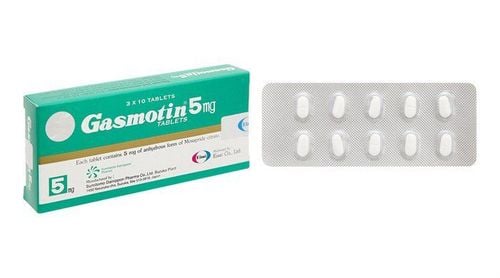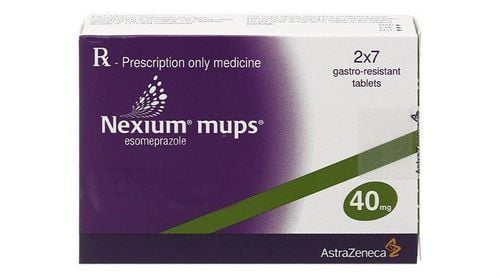Article reviewed and approved by Dr. Tran Quoc Vinh, Specialist Level I, Emergency Department, International General Hospital Vinmec Nha Trang.
Stomach pain is a common gastrointestinal disease that leaves many complications for sufferers. Many people wonder if they should eat yogurt with stomach pain because this is a very good digestive enzyme supplement for the body.
1. Gastric Ulcers and Associated Risks
Stomach pain, or gastric ulcers, is a widespread condition. In fact, according to data recorded by the World Health Organization (WHO) in 2012, the prevalence of gastric ulcers in certain Southeast Asian countries reached 40.8%. Despite its prevalence, the condition remains misunderstood.
In essence, gastric ulcers, or dyspepsia, are characterized by discomfort and a burning sensation in the stomach. These ulcers are typically open sores on the stomach's lining, caused by factors such as Helicobacter pylori infections, prolonged use of non-steroidal anti-inflammatory drugs (NSAIDs), or stress. Gastric ulcers occur when the balance between digestive secretions and the protective mucosal barrier is disrupted. This imbalance, either due to an increase in gastric acid or a decrease in mucosal protection, can lead to self-digestion of the stomach lining, resulting in ulcers.

While gastric ulcers are among the more treatable digestive diseases, neglecting proper treatment can lead to severe consequences. Many people underestimate the condition, considering it common, but untreated ulcers can cause significant complications, including bleeding.
When bleeding occurs in the stomach, it may cause severe pain, vomiting blood, or the passing of black, tarry stools, indicative of gastrointestinal bleeding. If left untreated, ulcers can perforate the stomach wall, allowing digestive fluids, blood, and food particles to leak into the abdominal cavity. This can trigger peritonitis, an intensely painful inflammation of the abdominal lining, which may lead to life-threatening complications such as sepsis. To prevent acute stomach conditions with severe repercussions, it is critical to adopt a healthy diet and include foods that promote the growth of beneficial bacteria, such as:
- Vegetables like broccoli, cabbage, turnips, and cauliflower. Leafy greens such as kale and spinach.
- Probiotic-rich foods like sauerkraut, miso, and kombucha (especially those containing Lactobacillus and Saccharomyces strains).
- Fruits like apples, blueberries, raspberries, and strawberries, along with olive oil.
Additionally, for those with gastric ulcers, it is advisable to avoid spicy or acidic foods during the healing process.

2. Should People with Gastric Ulcers Consume Yogurt?
People with gastritis should eat yogurt? It must be a question that many people are interested in, because yogurt is a good food for the digestive system, but it is acidic, so many people wonder if people with stomach diseases can use it or not?According to doctors, yogurt is a good food for people with stomach ulcers because it can help increase good bacteria in the digestive system. Yogurt contains probiotics that can increase the body's ability to fight harmful bacteria. Not only that, yogurt rich in good bacteria can also soothe the stomach to relieve GERD. With the use of yogurt, the time it takes for food to move into the intestines can be increased faster.
The American Gastroenterology Association also recommends yogurt to maintain a healthy digestive system, helping to relieve constipation, diarrhea, and other intestinal problems. There are a number of studies on the effects of probiotics showing the effectiveness of yogurt on the health of the digestive system such as:
Research published in the Journal of Digestive Diseases in 2009 has shown that probiotics have It has a healing effect on the intestinal tract and prevents constipation. The study, published in the American Journal of Clinical Nutrition, looked at the effect of adding a cup of probiotic yogurt along with medical treatment from a doctor. As a result, treatment with stomach ulcer medicine after providing yogurt was 4 times more effective in treating ulcers caused by H.pylori bacteria. Up to 86% of people who consumed yogurt along with stomach ulcer medication had a greater reduction in H. pylori bacteria than 71 percent of those who took ulcer medicine alone. So, people with stomach ulcers should eat yogurt? then the answer is yes because yogurt is very safe for people with stomach ulcers. However, you need to choose yogurt that contains active bacteria in it that is good for the body.
3. How to use yogurt properly
Can individuals with gastric ulcers safely eat yogurt? This question is widely debated because while yogurt is beneficial for digestion, its acidic nature may raise concerns for those with stomach issues.
Medical professionals affirm that yogurt is beneficial for individuals with gastric ulcers as it fosters the growth of healthy bacteria in the digestive tract. Yogurt contains probiotics that enhance the body's defense against harmful bacteria. Furthermore, the probiotics in yogurt may alleviate symptoms of gastroesophageal reflux disease (GERD) by soothing the stomach. Yogurt consumption may also facilitate quicker passage of food into the intestines.

The American Gastroenterological Association also recommends yogurt as part of a diet to maintain digestive health, citing its ability to alleviate constipation, diarrhea, and other intestinal issues. Research has demonstrated the positive impact of probiotics in yogurt on gastrointestinal health:
- A study published in the Journal of Digestive Diseases (2009) highlighted probiotics' therapeutic effects on the gastrointestinal tract and their ability to prevent constipation.
- Research in the American Journal of Clinical Nutrition investigated the combined effects of probiotic-rich yogurt and medical treatment for ulcers. Results showed that the combination was four times more effective at treating ulcers caused by H. pylori than medication alone.
- Up to 86% of participants who consumed yogurt alongside ulcer medication experienced greater reductions in H. pylori levels compared to 71% of those relying solely on medication.
Thus, yogurt is considered safe and even advantageous for those with gastric ulcers. However, choosing yogurt with active and beneficial bacterial cultures is essential for optimal health benefits.

3. How to Consume Yogurt Appropriately
While yogurt is safe for people with gastric ulcers, it is vital to consume it in a manner that maximizes its benefits.
Yogurt and fermented dairy products offer diverse health advantages. Beyond aiding digestion, probiotics in yogurt can also support heart health and act as antioxidants.
To derive the most health benefits, it is essential to consume yogurt in moderation as part of a balanced diet. Here are some guidelines for optimal yogurt consumption:
- Breakfast: Yogurt makes an excellent breakfast option, particularly for those aiming to lose weight. It provides sufficient nutrients and energy for the morning while supporting digestive health.
- Post-meal: Consuming yogurt as a dessert is preferable to sugary alternatives. It can also aid in reducing blood cholesterol levels.
Yogurt is a safe, weight-conscious snack choice that may even enhance mood. Research has shown that consuming yogurt can have a similar mood-boosting effect as chocolate, leaving individuals feeling happier. Yogurt can also be particularly beneficial during travel by preventing common digestive issues such as diarrhea, stomach pain, and nausea caused by exposure to unfamiliar bacteria in food. For maximum efficacy, yogurt should ideally be consumed on an empty stomach or as part of breakfast. This allows the probiotics to survive the journey to the colon, where they exert their beneficial effects. Consuming yogurt after a meal may expose the probiotics to stomach acid, reducing their viability and effectiveness.
However, individuals with chronic gastritis or other persistent stomach issues should avoid consuming yogurt on an empty stomach. For such individuals, waiting at least an hour after a full meal before eating yogurt is recommended.
To arrange an appointment, please call … or make your reservation directly HERE. You may also download the MyVinmec app to schedule appointments faster and manage your reservations more conveniently.














